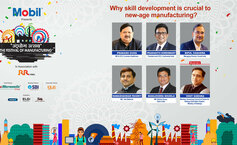
India's economy is intricately woven with threads from the traditional 'Vishwakarma' artisans. These craftsmen, the heartbeats of our heritage, have embellished our culture for centuries. Recognising their invaluable contribution and the need to usher them into the contemporary business landscape, the government introduced the PM Vishwakarma Scheme on September 17, 2023. Besides being a beacon of hope for these artisans, this initiative has also unfurled a plethora of collaboration opportunities for India's larger manufacturing firms.
With a robust allocation of Rs 13,000 crore, the PM Vishwakarma Scheme has a multidimensional approach. It envisions not only skill enhancement and tool modernisation for artisans but also provides avenues for financial empowerment through accessible loans and contemporary transaction methods like online payments. Additionally, it endeavours to broaden their horizons, introducing their unparalleled crafts to expansive markets.
Shri Narendra Modi, our Honourable Prime Minister, has passionately endorsed this scheme, highlighting its potential to transform a myriad of 'Vishwakarma' artisans, spanning diverse domains like blacksmiths, potters, carpenters, and sculptors. Under the guardianship of the Ministry of Micro, Small & Medium Enterprises (MoMSME), and with the staunch support of Ministry of Skill Development and Entrepreneurship (MSDE) and the Department of Financial Services, the scheme is poised for a holistic impact.
But where do the giants of manufacturing fit into this mosaic?
The strengths of these larger enterprises lie in their vast reservoirs of resources and expertise. By aligning with the Vishwakarma scheme, they can play an instrumental role in sculpting the artisans of tomorrow. These firms can harness their infrastructural capabilities to offer state-of-the-art training, refining artisanal skills to meet global benchmarks.
Moreover, with their technological prowess, major manufacturers have the potential to carve out digital realms specifically curated for artisans. This would entail deploying advanced technologies to foster efficient, secure, and streamlined operations, allowing artisans to navigate the digital world with ease.
One of the most significant boons larger corporations can offer is integration into their expansive supply chains. Such a collaboration would open floodgates of opportunities for artisans, magnifying their reach and thereby, their sales. Furthermore, given the marketing acumen of these large firms, they can architect campaigns that harmoniously blend the allure of tradition with contemporary appeal, making these crafts resonate with today's consumers.
Now visualise, in a remote Indian village, traditional blacksmiths create unique iron utensils and tools, but their reach is limited to local markets. A global kitchenware conglomerate, seeking unique products, partners with these artisans, recognising the growing demand for rustic, hand-forged items. Integrating the blacksmiths' work into their supply chain, these handcrafted items are refined for modern kitchens and soon make their debut in elite stores across global cities. The conglomerate launches a campaign, "Forged with Tradition," merging the artistry of these traditional blacksmiths with contemporary culinary scenes. This initiative not only takes the blacksmiths' craft to international audiences but also meets the modern consumer's desire for authentic, story-rich products.
Imagine, in the serene backwaters of Kerala, a group of skilled boat makers, using age-old methods, handcraft traditional wooden boats. Their craftsmanship, rich in cultural heritage, primarily attracts local fishers and tourists. However, a luxury resort chain, aiming to provide authentic experiences to its international guests, discovers these craftsmen. They collaborate, commissioning bespoke, larger versions of these boats, outfitted with modern comforts while preserving traditional aesthetics. Here is a collaboration.
The merger of age-old techniques with cuttingedge technology can be the touchstone of quality enhancement. Major businesses, by facilitating this amalgamation, can assist artisans in elevating the quality of their products while retaining the essence of tradition. In an era where sustainability is paramount, these businesses can also spotlight the ecofriendly characteristics inherent in artisanal products, augmenting their global desirability.
A goldmine of knowledge and expertise lies with these manufacturing giants. By initiating knowledgesharing platforms, they can significantly bridge the knowledge gaps that artisans might grapple with.
In conclusion, the PM Vishwakarma Scheme is a monumental stride for India's artisans and a beckoning call for its manufacturing behemoths. The confluence of these two worlds promises to fortify India's manufacturing landscape, poised to etch India's name as a manufacturing titan on the global map. This partnership is a synergy of tradition and modernity, not just about commerce but the creation of a legacy.





































